
Takeshi Kitano, also known as Beat Takeshi in Japan, is a Japanese comedian, actor, and filmmaker. While he is known primarily as a comedian and TV host in his native Japan, he is better known abroad for his work as a filmmaker and actor as well as TV host.

Ichi the Killer is a 2001 Japanese horror yakuza film directed by Takashi Miike, written by Sakichi Sato, and starring Tadanobu Asano and Nao Omori. Based on Hideo Yamamoto's manga series of the same name, its plot follows a psychologically damaged man who is manipulated into assaulting or killing rival faction members of feuding yakuza gangs while being pursued by a sadomasochistic enforcer.
Susumu Terajima is a Japanese actor. Though he has played a wide range of characters, he is perhaps best known for his portrayal of yakuza figures, most notably in the films of Takeshi Kitano.
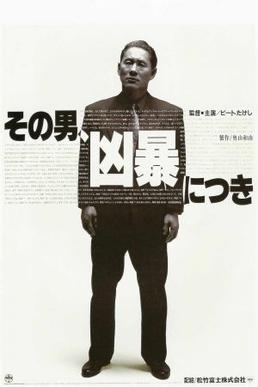
Violent Cop is a 1989 Japanese neo-noir action thriller film directed by Takeshi Kitano, written by Kitano and Hisashi Nozawa, and starring Kitano, Maiko Kawakami, Makoto Ashikawa, Hakuryu, Ken Yoshizawa, and Ittoku Kishibe. It follows Azuma, a Japanese police detective known for his rough and unprofessional conduct, after he is assigned to investigate drug trafficking by the yakuza. It was Kitano's directorial debut, and marked the beginning of his career as a filmmaker.

A Scene at the Sea is a 1991 Japanese drama film written, edited and directed by Takeshi Kitano starring Claude Maki.
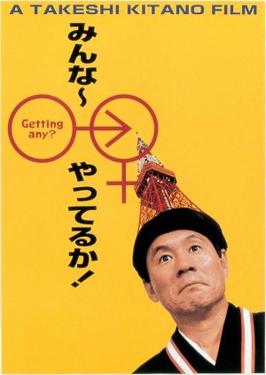
Getting Any? is a 1995 Japanese film, written, directed, edited, and starring Takeshi Kitano. Yatteru (やってる) is the colloquial form for yatteiru (やっている), yatteru coming from the Japanese verb yaru, which is an informal word meaning 'to do', and has become slang for sexual intercourse. The film is a sex comedy. It showed Beat Takeshi, originally a very popular manzai performer, returning to his comedic roots. The movie features an Airplane!-like assemblage of comedic scenes centering on a Walter Mitty-type character whose obsession is to have sex.

Kids Return is a 1996 Japanese film written, edited and directed by Takeshi Kitano. The film was made directly after Kitano recovered from a motorcycle wreck that left one side of his body paralyzed. After undergoing extensive surgery and physical therapy, he quickly went about making Kids Return amidst speculation that he might never be able to work again. The movie is about two high school dropouts, Masaru and Shinji, who try to find a direction and meaning in their lives—one by becoming a yakuza lieutenant, the other by becoming a boxer.
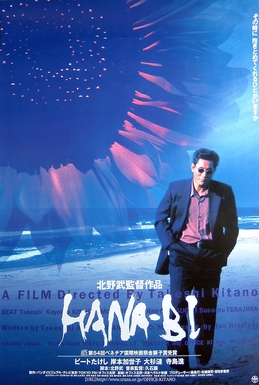
Hana-bi, released in the USA as Fireworks, is a 1997 Japanese crime drama film written, directed and edited by Takeshi Kitano, who also stars in it. The film's score was composed by Joe Hisaishi in his fourth collaboration with Kitano.
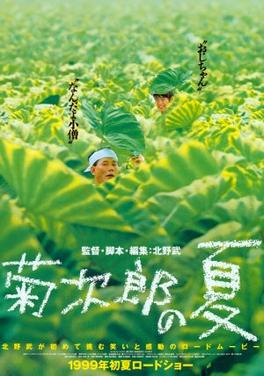
Kikujiro is a 1999 Japanese road drama film written, directed and co-edited by Takeshi Kitano, who also stars in the film with Yusuke Sekiguchi. Its score was composed by Joe Hisaishi. The film was entered into the 1999 Cannes Film Festival.

Brother is a 2000 crime film starring, written, directed, and edited by Takeshi Kitano. The film premiered on September 7, 2000 at the Venice Film Festival. The plot centers on a mature yakuza gangster who has to flee to America, where he unites forces with his little brother and his brother’s gang in Los Angeles.

Takeshis' is a 2005 Japanese film directed, written, edited by, and starring Takeshi Kitano. It is the first film in Kitano's surrealist autobiographical trilogy, being followed by Glory to the Filmmaker!, and Achilles and the Tortoise.

Yakuza film is a popular film genre in Japanese cinema which focuses on the lives and dealings of yakuza, Japanese organized crime syndicates. In the silent film era, depictions of bakuto as sympathetic Robin Hood-like characters were common.

Sympathy for the Underdog, known in Japan as Bakuto Gaijin Butai, is a 1971 Japanese yakuza film directed and co-written by Kinji Fukasaku and starring Kōji Tsuruta and Noboru Ando. It is director Fukasaku's last film featuring Kōji Tsuruta. Complex named it number 8 on their list of The 25 Best Yakuza Movies. Home Vision Entertainment released the movie on DVD in North America in 2005.

Zatoichi is a 2003 Japanese jidaigeki action film, directed, written, co-edited by and starring Takeshi Kitano in his eleventh directorial venture. Kitano plays the role of the blind swordsman, with Tadanobu Asano, Michiyo Okusu, Yui Natsukawa, Guadalcanal Taka, Daigoro Tachibana, Yuko Daike, Ittoku Kishibe, Saburo Ishikura, and Akira Emoto in supporting roles.

Boiling Point is a 1990 Japanese crime film written and directed by Takeshi Kitano, who also co-stars under his stage name Beat Takeshi. It was Kitano's second film as a director and first film as a screenwriter. Boiling Point is seen as an important first step in his development as an editor and as a director.
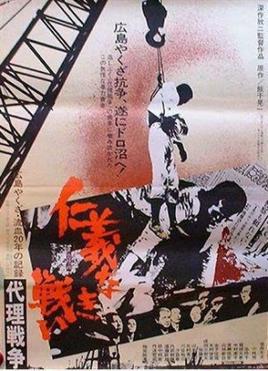
Battles Without Honor and Humanity: Proxy War is a 1973 Japanese yakuza film directed by Kinji Fukasaku. It is the third film in a five-part series that Fukasaku made in a span of just two years, focusing on the events prior to a major war between Hiroshima yakuza in the early 1960s.
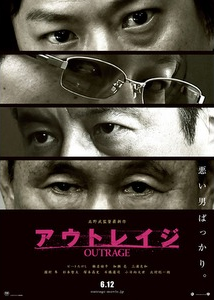
Outrage is a 2010 Japanese yakuza film written, directed, co-edited and starring Takeshi Kitano. It competed for the Palme d'Or at the 2010 Cannes Film Festival. It is followed by Beyond Outrage (2012) and Outrage Coda (2017).

Beyond Outrage is a 2012 Japanese yakuza film directed by and starring Takeshi Kitano, with Toshiyuki Nishida, and Tomokazu Miura. It is a sequel to Kitano's 2010 film Outrage and was followed by the 2017 film Outrage Coda.

Ryuzo and the Seven Henchmen, also known as Ryuzo 7, is a 2015 Japanese action comedy film directed by Takeshi Kitano. It was released on April 25, 2015.

Outrage Coda is a 2017 Japanese yakuza film directed by Takeshi Kitano and starring Kitano himself. It was released in Japan on 7 October 2017. It is a sequel to Kitano's 2012 film, Beyond Outrage, and completes Kitano's Outrage trilogy started in 2010. It received its premiere when it was screened out of competition at the 74th Venice International Film Festival.





















